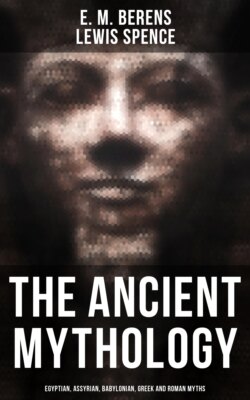Читать книгу The Ancient Mythology: Egyptian, Assyrian, Babylonian, Greek and Roman Myths - Lewis Spence - Страница 106
На сайте Литреса книга снята с продажи.
CHAPTER VII:
THE PANTHEON OF ASSYRIA
ОглавлениеThe Pantheon of Assyria, as befitted the religious system of a nation of soldiers, was more highly organized than that of the kindred people of Babylonia, the ranks and relationships of the gods who comprised it were more definitely fixed, it was considerably more compact than that of the southern kingdom, and its lesser luminaries were fewer. It has been assumed that the deities of the Assyrians were practically identical in every respect with those of the Babylonians, with the single exception of Asshur, who equated with Merodach. With all due respect to practical Assyriologists the student of Comparative Religion may perhaps be granted leave to take exception to such a statement. Ethnological differences (and these certainly existed between the peoples of the northern and southern culture-groups), climatic conditions, a different political environment—all these as well as other considerations, as important if less obvious, must have effected almost radical changes in the ideas of the gods as conceived by the Assyrians. Exactly what these changes were we shall probably never know. They are scarcely likely to be revealed by inscriptions or sacred writings which undoubtedly conserve for us little more than the purely ecclesiastical view-point, always anxious to embalm with scrupulous care the cherished theological beliefs of an older day. But little of the religious beliefs of a people can survive in priestly inscriptions and the labours of priestly copyists, nor is it safe or scientific to endorse the character of the faith of a race by comparison or analogy with that of a neighbouring folk. If a striking example were required of the danger of such a proceeding it might be found in the vain attempt to discover an exact parallel between the religious systems of ancient Mexico and those of Guatemala and Yucatan. The city-states of the more northerly group of people had evolved a separate system of worship for each pueblo or town, the deities of which, with minor differences, were substantially identical. But when the pantheons of the more southerly region come to be examined it will be found that, although the gods which figure in them spring apparently from the same stock as those of the Mexican people, and even possess names which are mere translations of those of the gods of Mexico, their attributes and characteristics differ profoundly from those of their Mexican congeners. The reason for this dissimilarity is to be found in variations of climate, culture, and politics, three sure factors in the modification of religion. If, then, we are satisfied that such differences existed in the religious systems of two race-groups almost as closely connected as were the peoples of Babylonia and Assyria, may we not be pardoned for the supposition that similar divergences existed between the faiths of the two great races of Chaldea?
We find in the Assyrian pantheon numerous foreign deities whom the Assyrian kings included among the national gods by right of conquest. These we shall deal with later. It will suffice for the present to mention Assur-bani-pal, who speaks of the capture of twenty gods of the Elamites. It was, of course, only upon the rise of a distinct Assyrian empire that the religion of the northern kingdom acquired traits that distinguished it from that of Babylonia.
Having outlined the reasons for the differences which we believe to have existed between the Babylonian and Assyrian faiths, let us briefly consider the variation of type between the two peoples which must have caused this divergence. The languages of the two races were not more distinct than the dialects of northern and southern England—indeed among scholars they are designated by the common name of Assyrian. But the Assyrians had a pure strain of that Semitic blood which has done so much to systematize religions ancient and modern. The Semite cannot content himself with half-truths. It is essential to his very life, that he must feel himself upon sure religious ground. He hates doubt and despises the doubter. At an early time in his ancient career he had so securely systematized religion as to supply the earliest instances of pure dogma. There followed the relentless abjuration of all the troublous circumstances of mistrust. A code founded upon the rock of unquestioning faith was instituted. And in the religious systems of Babylonia and especially of Assyria we observe a portion of the process of evolution which assisted in the upbuilding of a narrow yet highly spiritualized system.
The great gods in Assyria were even more omnipotent than in Babylonia. One cause contributing to this was the absorption of the minor local cults by deities associated with the great centres of Assyrian life. Early religion is extremely sensitive to political change, and as a race evolves from the tribal or local state and bands itself into a nation, so the local gods become national and centralized, probably in the great deity of the most politically active city in the state. Nor is it essential to this process that the deities absorbed should be of a like nature with the absorbing god. Quite often a divinity assumes the name and attributes of one with whom he had little in common.
